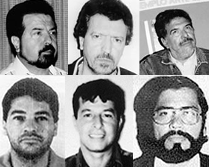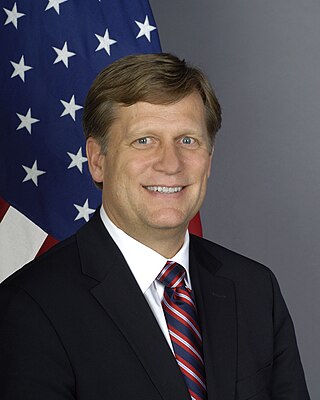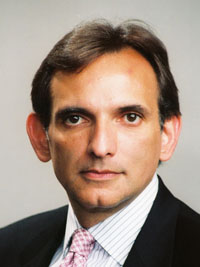
Vladimir Vladimirovich Putin is a Russian politician and former intelligence officer who is the president of Russia. Putin has held continuous positions as president or prime minister since 1999: as prime minister from 1999 to 2000 and from 2008 to 2012, and as president from 2000 to 2008 and since 2012. He is the longest-serving Russian or Soviet leader since Joseph Stalin.

The Cali Cartel was a drug cartel based in southern Colombia, around the city of Cali and the Valle del Cauca. Its founders were the brothers Gilberto Rodríguez Orejuela, Miguel Rodríguez Orejuela and José Santacruz Londoño. They broke away from Pablo Escobar and his Medellín associates in 1988, when Hélmer "Pacho" Herrera joined what became a four-man executive board that ran the cartel.

Leonid Danylovych Kuchma is a Ukrainian politician who was the second president of Ukraine from 19 July 1994 to 23 January 2005. The only President of Ukraine to serve two terms, his presidency was marked by democratic backsliding and the growth of the Ukrainian oligarchs, as well as several scandals and improvement of Russia–Ukraine relations.

Andrey Nikolayevich Illarionov is a Russian economist and former senior policy advisor to Vladimir Putin, the President of Russia, from April 2000 to December 2005. Since April 2021, he is a senior fellow at the non-governmental organization Center for Security Policy, which is based out of Washington, D.C. in the United States.

The Cassette Scandal was a Ukrainian political scandal in November 2000 in which Ukrainian president Leonid Kuchma was caught on tape ordering the months-earlier kidnapping of journalist Georgiy Gongadze, whose decapitated corpse had recently been found. The scandal was one of the main political events in Ukraine's post-independence history, dramatically affecting the country's domestic and foreign policy. The scandal, triggering the Ukraine Without Kuchma protests, also began a slow and gradual shift of Ukraine's political and cultural orientation from Russia towards the West, although this only became more pronounced after Euromaidan in 2013–2014. The scandal also damaged Kuchma's political career.

Boris Vyacheslavovich Gryzlov is a Russian politician currently serving as the Russian Ambassador to Belarus. Previously, he served as the chairman of the State Duma from 2003 to 2011 and as interior minister from 2001 to 2003. He was also the leader of the ruling United Russia party.
Vladimir Kumarin, aka Vladimir Barsukov, aka "Kum" is a Russian businessman, former deputy president of the Petersburg Fuel Company (PTK) between 1998 and 1999, and the boss of the criminal Tambovskaya Bratva of Saint Petersburg.
Vladimir Alexeyevich Smirnov is a Russian scientist and businessman, former Director General of the Petersburg Fuel Company (1997–1998), former Chairman of the Board of Directors of the Petersburg Fuel Company (1999–2001). Between 2002–2007, he was the Director General of Tekhsnabexport (TENEX) which carries out export of goods and services produced by Russian nuclear enterprises. He is a close associate of Russian President Vladimir Putin.

Sergey Yevgenyevich Naryshkin is a Russian politician and businessman who has served as the director of the Foreign Intelligence Service since 2016. Previously, he was Chairman of the State Duma (2011–2016) and Kremlin Chief of Staff (2008–2012); he was also chairman of the Historical Truth Commission from May 2009 until it was dissolved in February 2012.
A diverse variety of informal political groups emerged since the presidency of Vladimir Putin starting in 1999. They include remnants of the Yeltsin family, Saint Petersburg lawyers and economists, and security-intelligence elements called the siloviki.

Michael Anthony McFaul is an American academic and diplomat who served as the United States ambassador to Russia from 2012 to 2014. McFaul is currently the Ken Olivier and Angela Nomellini Professor in International Studies in the Department of Political Science at Stanford University, where he is the Director of the Freeman Spogli Institute for International Studies. He is also a Peter and Helen Bing Senior Fellow at the Hoover Institution. He is also a contributing columnist at The Washington Post. Prior to his nomination to the ambassadorial position, McFaul worked for the U.S. National Security Council as Special Assistant to the President and senior director of Russian and Eurasian affairs, where he was the architect of U.S. President Barack Obama's Russian reset policy.

Russia–Turkey relations are the bilateral relations between Russia and Turkey and their antecedent states. Relations between the two are rather cyclical. From the late 16th until the early 20th centuries, relations between the Ottoman and Russian empires were normally adverse and hostile and the two powers were engaged in numerous Russo-Turkish wars, including one of the longest wars in modern history. Russia attempted to extend its influence in the Balkans and gain control of the Bosphorus at the expense of the weakening Ottoman Empire. As a result, the diplomatic history between the two powers was extremely bitter and acrimonious up to World War I. However, in the early 1920s, as a result of the Bolshevik Russian government's assistance to Turkish revolutionaries during the Turkish War of Independence, the governments' relations warmed. Relations again turned sour at the end of WWII as the Soviet government laid territorial claims and demanded other concessions from Turkey. Turkey joined NATO in 1952 and placed itself within the Western alliance against the Warsaw Pact during the Cold War, when relations between the two countries were at their lowest level. Relations began to improve the following year, when the Soviet Union renounced its territorial claims after the death of Stalin.

Russia–South Africa relations are foreign relations between Russia and South Africa. Full diplomatic relations were established between both countries in 1942 as the Soviet Union. Russia has an embassy in Pretoria and a consulate-general in Cape Town. South Africa has an embassy in Moscow. Both countries are also members of BRICS.

The nations Mexico and Russia initially established diplomatic relations in 1890. In 1924, Mexico recognized and established diplomatic relations with the Soviet Union. In 1930, Mexico broke diplomatic relations with the USSR and granted asylum to Leon Trotsky. In 1943, Mexico and the USSR re-established diplomatic relations. After the dissolution of the union, Mexico once again established diplomatic relations with the current Russian Federation in 1992.

There are currently no diplomatic or bilateral relations between Russia and Ukraine. The two states have been at war since Russia invaded the Crimean peninsula in February 2014, and Russian-controlled armed groups seized Donbas government buildings in May 2014. Following the Ukrainian Euromaidan in 2014, Ukraine's Crimean peninsula was occupied by unmarked Russian forces, and later illegally annexed by Russia, while pro-Russia separatists simultaneously engaged the Ukrainian military in an armed conflict for control over eastern Ukraine; these events marked the beginning of the Russo-Ukrainian War. In a major escalation of the conflict on 24 February 2022, Russia launched a large scale military invasion across a broad front, causing Ukraine to sever all formal diplomatic ties with Russia.

Brazil and Ukraine are strategic partners and cooperate in trade, space technology, education, energy, healthcare, and defense. Brazil recognized Ukraine's independence on December 26, 1991, and bilateral relations were established on February 11, 1992. The development of a joint space industry had strengthened the bilateral ties between the two countries. Ukraine considers Brazil its key trade partner in Latin America and has been a vocal supporter of the Brazilian bid for a permanent seat at the United Nations Security Council.

The Embassy of the United States of America in Kyiv is the diplomatic mission of the United States to Ukraine.

Katerina Vladimirovna Tikhonova is a Russian scientist, manager, and former acrobatic dancer. She is the second daughter of Russian president Vladimir Putin.

Amos J. Hochstein is an American businessman, diplomat, and former lobbyist. Currently the Deputy Assistant to the President and Senior Adviser for Energy and Investment under U.S. President Joe Biden, he has worked in the U.S. Congress, has testified before congressional panels and has served in the Barack Obama administration under Secretaries of State Clinton and Kerry. He was appointed Deputy Assistant Secretary of State in 2011 and as Special Envoy and Coordinator for International Energy Affairs in 2013. In 2015, President Barack Obama nominated Hochstein to be the Assistant Secretary of State for Energy Resources but the Senate did not act on the nomination.

Fiona Hill is a British-American foreign affairs specialist and author. She is a former official at the U.S. National Security Council, specializing in Russian and European affairs. She was a witness in the November 2019 House hearings regarding the impeachment inquiry during the first impeachment of Donald Trump. She earned a Ph.D. in history from Harvard University in 1998. She currently serves as a Senior Fellow at the Brookings Institution in Washington. She was installed as Chancellor of Durham University in June 2023.


















